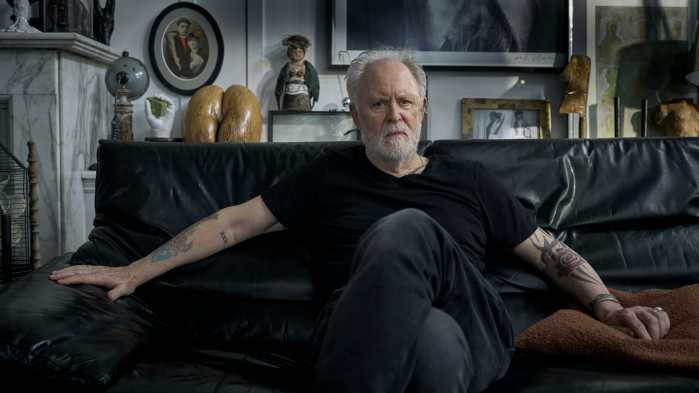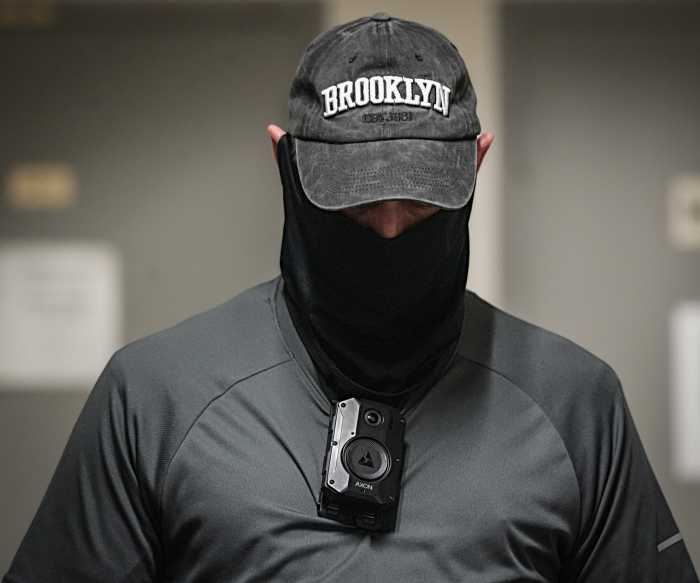“Twinless” is an intriguing investigation of identity as Roman (Dylan O’Brien) and Dennis (out gay writer/director James Sweeney) share their grief and loneliness after meeting at a support group for twins who have lost their siblings. Roman, who is straight, is processing his emotions regarding Rocky, his late, estranged twin, who was gay. However, Dennis, who is gay, appreciates Roman’s company for other reasons.
Gay City News spoke with Sweeney and O’Brien about making “Twinless” and their insights about portraying twins.
Like Rocky and Roman, I am a twin, and my twin is straight. James, what research did you do on twins?
James Sweeney: I have always been interested in twins, specifically, the psychology of twins. As you know, a lot of research studies are done on twins. I have friends who are twins, and two appear in the film. I dated an identical twin who also had a straight brother. It wasn’t until I started writing the screenplay that I did my deep dive in terms of twin bereavement and developmental psychology. Being a twin isn’t a monolithic experience, but I tried to find specificity in the twin experience that made sense for these two characters who became estranged in their teenage years and how that would inform their disparate lives. We had twins read the script and we cast twins. All of the actors in the support group are twins. I tried to have twin approval in each stage of the process. But I didn’t go to a twin support group. That didn’t feel right for this.
Dylan, can you talk about playing Rocky and Roman and their differences? You are often objectified.
Dylan O’Brien: I love being objectified! [Laughs] I was drawing from a sense of freedom. I operated from a place of liberation with Rocky, and that was down to his physicality and the clothes he wears and what he decides to do with his facial hair. I love the freedom that we see Rocky go about in his world and it informs a different path [from Roman’s]. I saw Roman more in the incubator years of that type of evolution. He’s so locked in. He is not confident as a speaker. Socially, he knows one town, and a few guys he grew up with. He is not worldly. He hasn’t tried a lot of cuisines. [Laughs] He doesn’t know what a lot of words mean. It’s a different stage of evolution. I feel I’ve been both of these guys at different times in my life. Rocky is able to tap into his emotional intelligence under the covers and that being so crucial to the narrative — and Dennis’ narrative — and for Roman, as well, to see how much his brother loved him.
The film is about grief and loneliness. But I also see it about codependence; Dennis and Roman both need each other for different reasons. Can you talk about these themes?
James Sweeney: I don’t know that the two are mutually exclusive. One interesting facet of some twin experience I learned in my research is that intimacy can come more easily to twins because you are literally born with another person. That can have implications and ripple effects on other platonic and romantic relationships. Roman is looking for that and missing that because he knows what it is like. I don’t see their friendship as inherently toxic. Roman and Dennis both value quality time. For some people, that might be too much.
Dylan O’Brien: It’s an interesting thought. It’s not how I viewed the piece. I have a different idea of where codependence can be unearthed from in a person and how it can manifest. I have always thought of it more from the standpoint of seeing two characters providing solace and comfortability for the other in a moment that can’t be replicated. As we see, it will only be that for them as well. Their relationship will take a new shape. It’s the story of a character who didn’t get a resolution with the death of a loved one and loses someone who he shared an identity with and did not have closure. He parlays that loss into learning about that person via a new friend.
The film’s most emotional moment may be when Dennis tells Roman to talk to him as if he were Rocky. Can you discuss the dynamic between Dennis and Roman and Dennis and Rocky?
James Sweeney: That scene is absolutely about those two things, but the monologue is the unearthing of the relationship between Roman and Rocky. We get the most insight into how fractured Roman is and the shame he has internalized and the fear and grief he is contending with and that flows out of him. In that moment, Dennis sees more transparently than ever what he is going through, and that obviously colors their friendship moving forward.
Dylan O’Brien: That scene captured so many things in one story. I found it a compelling way to authentically show the type of grief that this character is enduring. It was a striking moment to see him discovering himself. I do think there is something to processing and Roman not being skilled at that. Sometimes you need that type of catharsis.
James Sweeney: Credit to you for saying these new words that he’s never let himself think before.
How does the sexuality of the characters influence their behavior?
James Sweeney: Sexuality is so infused into the storytelling. It’s what incites a rift between Roman and Rocky, because Roman realizes — and internalizes — that they are no longer the same person. That’s what connects Dennis and Roman, because for Roman, he sees Dennis as an opportunity to make up for lost time.
Dylan O’Brien: I love touching on the regret Roman has when Rocky came out him. There is such authenticity to that. Male humans grow up with this bizarre but conditioned mentality to be masculine and that there is one idea of masculinity, and that is what you have to display. Your skill at displaying that or hiding femininity becomes your currency or survival. It’s such specific weaponry in adolescence. I think the trauma Roman was feeling when Rocky told him his sexuality differed from his. How will you be a part of things? I’m going to lose you. How do I balance both? On his own curiosity, he tried to engage with it. It was a surprising admission to hear from conventionally straight presenting characters. I loved the complexity of that reality.
“Twinless” | Directed by James Sweeney | Opening September 5 at the Angelika Film Center and AMC Lincoln Square | Distributed by Roadside Attractions



































